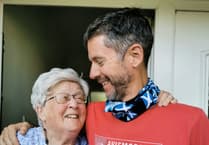I woke up at 3am on Friday, June 23, burning hot and itching all over. I went to the bathroom and saw my skin was crimson red and covered in hives.
My face and tongue swelled, my throat constricted, I felt a whoosh down to my feet and collapsed.
I came around moments later, struggling to breathe or move. I lay on the bathroom floor for 40 minutes, thinking I was going to die. Eventually my breathing became easier and, drained and exhausted, I went back to bed and fell asleep.
When I woke, I called 111 and was told it sounded like I’d had an anaphylactic shock. I was advised to go to A&E at Frimley Park Hospital.
When I was eventually seen by a doctor, they asked if I had any allergies and I said ‘no’. They said there would be no point testing for allergies because it takes a long time to get results and they’re often inconclusive.
The doctor told me to go home, buy antihistamines, and call an ambulance if it happens again.
Hoping the anaphylactic shock would be a strange, one-off occurrence, I took the doctor’s advice.
Looking back, I’m shocked I was told to go home without any investigation into the cause of my symptoms, simply because allergy testing seemed like an inconvenience.
I felt very unwell for the next couple of days: my skin was burning, my heartbeat was irregular and much faster than normal, I was struggling to breathe easily, and my tongue felt strange.
Then, on Sunday, June 25, I collapsed in a shop. Later that day, I collapsed five times in half-an-hour, falling to the floor and temporarily losing consciousness each time.
When I was able to, I crawled to the phone and called 111 and was told it sounded like I was experiencing allergic reactions and should contact my GP.
I did so but was told to call back at 8am the following day to make an appointment.
When I saw a GP the next day, I was terrified of what was happening and insisted on being given an EpiPen. The GP reluctantly agreed to this and told me to take antihistamines, prescribed steroids, and made an appointment for allergy testing.
My symptoms continued, and I began doing research to understand anaphylaxis and what could be causing it. I came across information about tick-borne illnesses which stood out to me as I’d recently been bitten by ticks.
These bites occurred at Henley Park in Pirbright and in Bisley Common, while I was dog walking. I learned of a seemingly rare condition called alpha-gal syndrome (AGS): a tick-borne illness that makes people allergic to the sugar molecule (alpha gal) found in all mammals except humans and other primates.
I hardly ever eat meat, but I quickly realised that both episodes of severe reactions had occurred hours after eating red meat.
I knew I needed to speak to a doctor about AGS and confirm my suspicion that it was causing my suffering.
After more episodes of fainting and trouble breathing, my GP said I needed to go back to A&E straight away. I was taken to Frimley Park Hospital and spent the entire day in A&E, explaining my symptoms and what I’d read about AGS to doctor after doctor, none of whom seemed convinced I could be allergic to meat.
I was admitted to the hospital where my heart was monitored. I asked to speak to an allergy specialist to discuss the potential of being allergic to mammal products, because nobody I’d spoken to had ever heard of the condition and just dismissed the idea.
On my third day as an inpatient, a consultant came to assess me, but they also had no knowledge of AGS. They ordered blood tests but did not tell me what they were for, then discharged me.
Feeling disappointed that nobody at the hospital had taken my concerns about the tick bites and AGS seriously, I booked a private blood test and the results confirmed I have the allergy.
AGS has made me allergic to all mammal products and by-products, including red meat and dairy but also household products and toiletries that contain ingredients like gelatine, lactose or glycerine.
Most concerningly, many medications contain these products – for example, the antihistamines I was told to take to treat my symptoms are made with mammal-derived ingredients that could trigger my allergic reactions.
Not everyone with this condition will react to all mammal products but I seem to be severely reactive, even to airborne alpha gal like fumes from cooking meat. This has left me housebound and only able to live on a small number of foods and products.
I’m yet to find medications I can safely take to manage my symptoms, so I can’t risk exposure by leaving my house, going to work or shops or restaurants, or even getting on a bus.
Going into anaphylaxis or fainting and being taken to hospital could be dangerous as, while in hospital, I was surrounded by things that were triggering reactions, such as foods, cleaning products and cooking fumes.
A couple of weeks after being discharged from hospital, I got a letter from the consultant who assessed me which said all the blood test results were normal.
This was surprising but I still had no idea what I was tested for, so I requested this information. In response, I received a second letter explaining that, in fact, my ‘alpha gal markers were elevated’ which meant I likely have an allergy to alpha gal but, for some reason, this was not picked up by the consultant.
After asking for full details of what I was tested for and the results numerous times, many weeks later I finally got access to this information.
Contrary to what I’d been told, of the 26 tests that were undertaken, six results were abnormal. A further four results were unavailable.
The results clearly showed I had suffered an anaphylactic reaction and am allergic to alpha gal in mammal products.
I’ve since made a formal complaint which is being investigated by the hospital. If I’d trusted what I was told by doctors, which many people understandably would, I’d have carried on using mammal products which could trigger a fatal reaction.
Desperate to get a proper diagnosis and support, I booked a private consultation with an allergy specialist. They ordered a blood test which showed I also have secondary mast cell activation syndrome – most likely triggered by AGS or the anaphylaxis.
This is another chronic, incurable condition that makes my body hypersensitive to all sorts of triggers. Anything from exercise to a change in temperature or the smell of detergent can trigger an overwhelming response as my mast cells go into ‘panic mode’ and release loads of histamine and other chemicals.
Unfortunately, MCAS (like AGS) puts me at risk of severe allergic reactions including anaphylaxis. Worst of all, most of the medications used to manage MCAS symptoms contain animal-derived ingredients which could also trigger a reaction in me.
Formerly a fit and healthy 28-year-old, I now have two life-altering and life-threatening conditions, both of which are poorly understood by healthcare professionals as well as the public.
I’m fighting to be believed when I say I have these conditions, because the attitude of many doctors I’ve encountered so far seems to be that if they haven’t heard of something, it doesn’t exist.
Also, I’ve found it almost impossible to find medications that don’t contain the very thing that makes me unwell.
I’ve had to restrict my diet so much that I’ve lost nearly 10kg and I can no longer work or live as normal. I don’t know how much longer I can go on like this, with my conditions untreated and unmanaged.
My family and I can’t afford further private treatment, like most people, but local hospitals have failed to offer care.
Alpha-gal syndrome is on the rise in the UK, and experts say this could be linked to changing climates.
My conditions were caused by tick bites while I was walking in the parks and commons around Woking. This could happen to anyone, so I want to raise awareness of the condition and the devastating impact it can have on people’s lives. Hospitals, high streets, shops… the whole world is currently unsafe for people who are severely allergic to mammal products and by-products, and those who have subsequently developed mast cell disorders like mine.
My family and I have started a petition to urge the government to include AGS in NICE [National Institute for Health and Care Excellence] guidelines and on the NHS website, to make mammalian meat an allergen that must be declared on food labels, and to commission much-needed research into this allergy in the UK.
We’d love local people’s support, so please sign and share the petition and help us raise awareness and understanding of AGS. It’s so much more than a red meat allergy.
To sign the petition, visit www.change.org
The petition has been raised by Lydia Goldman, my sister.
* A spokesperson for Frimley Health Foundation Trust said: “We are sorry Mr Goldman was dissatisfied with his care at Frimley Park Hospital. We are investigating his concerns and will share the findings with him at the earliest opportunity.”




